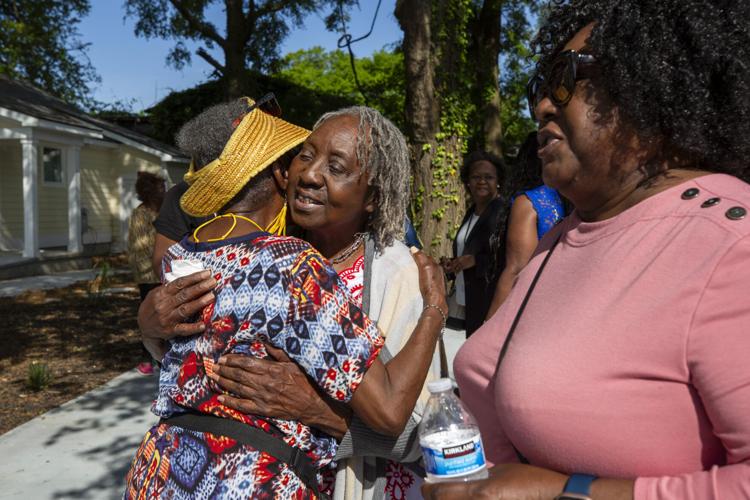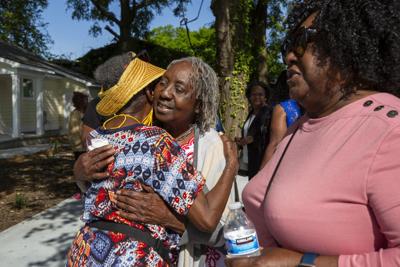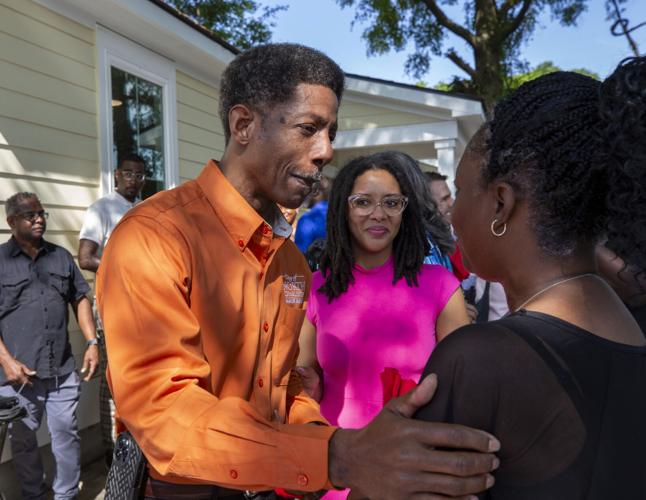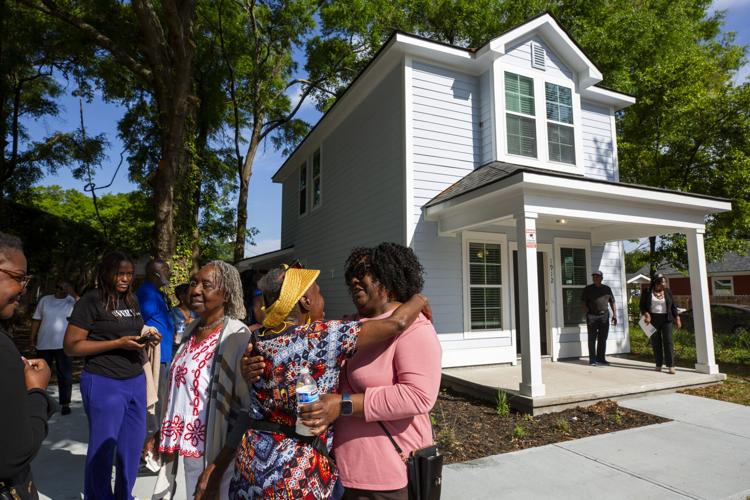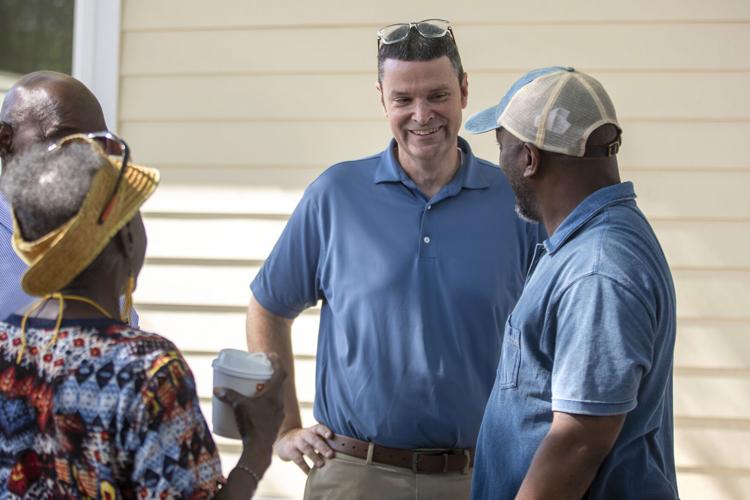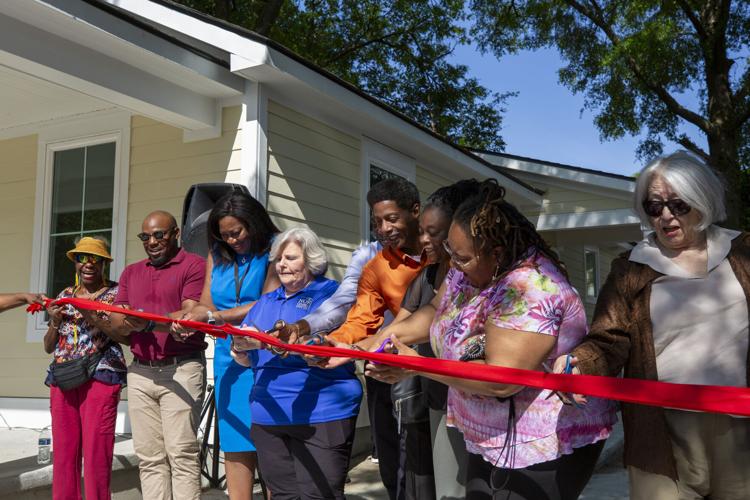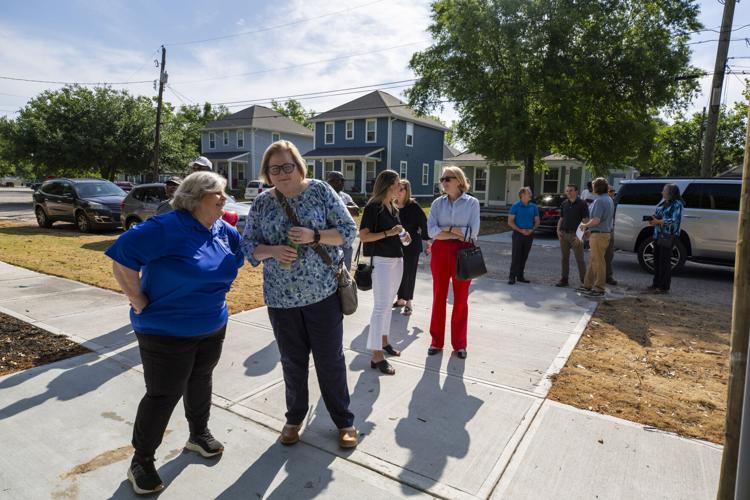NORTH CHARLESTON — The once-neglected south end of the city has become a hot spot for investors, threatening a rise in rental costs for the low-income community. But a cluster of affordable homes could be a silver lining to this potential housing crisis.
Ten new rental homes sit within a quarter-mile of one another in the Chicora neighborhood near Reynolds Avenue’s growing business corridor.
Photos: Metanoia provides 10 new affordable rental homes to Chicora neighborhood
Ten newly constructed affordable houses stand within a quarter-mile of one another in the Chicora neighborhood in North Charleston. Metanoia, a non-profit attempting to tackle the housing crisis, built and will be renting these homes to community members at an affordable price.
North Charleston Mayor Reggie Burgess (left) speaks with future Metanoia tenant Gail Chisolm (right) at the ribbon cutting for ten new rental homes built by Metanoia, a non-profit aiming to tackle the housing crisis, in North Charleston on Tuesday, April 16, 2024. Chisolm will move into her Craft Street rental home next month. “I ride by every day, I’m just so excited,” she said.
The two-to-three bedroom homes vary in cost depending on size and resident’s income. Several of the homes are meant for residents earning at or below 50 percent of the area median income, which is about $40,860 for a one-person household.
“We have known for quite some time that rising property values is a concern for neighbors in the community,” said Bill Stanfield, CEO of Metanoia, the nonprofit community development organization that helmed the project.
Take Beatrice Doctor, a longtime North Charleston resident and member of St. Matthew Baptist Church on Reynolds Avenue. She spent more than three decades serving the children in the area as a foster parent. She even adopted two of her foster children, who are now in their 30s.
Once the finishing touches are complete, Doctor will be moving into one of the affordable homes in Chicora. She’ll be living in her community and close to her church — all with the security of knowing she will not be pushed out due to rising rental costs.

Dennis Jones (left), Metanoia CEO Bill Stanfield (center) and Metanoia Board Chairperson Monifa Ellington (right) chat April 16, 2024 before the ribbon cutting for 10 new rental homes built by Metanoia, a nonprofit aiming to tackle the housing crisis in North Charleston. The homes will be rented out to North Charleston community members at affordable rates.
Metanoia’s work in the Chicora neighborhood is not limited to rental properties. The nonprofit is unveiling six homes for first-time homebuyers on Token Street and another four on Baxter Street set to be completed early next year. These homes will be for families earning at or below 80 percent of the area median income, which is about $73,450 for a family of four.
The ten rental homes in Chicora were funded in large part by the South Carolina Housing Finance and Development Authority. The land was purchased through a partnership between South Carolina Ports Authority and the Lowcountry Alliance for Model Communities .
Renaye Long, the director of strategic communications with SC Housing, called this project a “new chapter” for the Chicora neighborhood.
“This is just the beginning,” she said. “We are committed to affordable housing and that dream being the possibility for every South Carolinian.”

Debra Stewart and Fouché Sheppard talk on April 16 at the ribbon cutting for 10 new rental homes built by Metanoia, a nonprofit aiming to tackle the housing crisis in North Charleston. The homes will be rented out to North Charleston community members at affordable rates.
Chicora — and the handful of North Charleston’s south end neighborhoods — sit between the “neck” of the peninsula and the burgeoning Park Circle neighborhood. While some areas have flourished, these south end neighborhoods have been languishing.
More than half of the households in the south end make below $30,000, compared to Charleston County’s median income of $70,800, and these neighborhoods have a reputation for higher crime rates. This part of the city has lacked a grocery store for decades, making it a designated food desert.
This wasn’t always the case for the south end. The Navy Base, which opened in 1901, brought a stream of workers who lived in the nearby neighborhoods. The base reached its peak employment during World War II. By 1944, it employed 26,000 people.
The base closed in 1996. The neighborhoods became transient, which meant the people living there temporarily didn’t have a stake in their community, said Mayor Reggie Burgess.
He is now seeing a shift in the neighborhoods as more long-term residents are investing in their communities.
“Now, we’re seeing the transition,” Burgess said. “Because they live here now, they feel like, ‘I need to take care of my yard. I need to make sure my trash can is empty.’”

